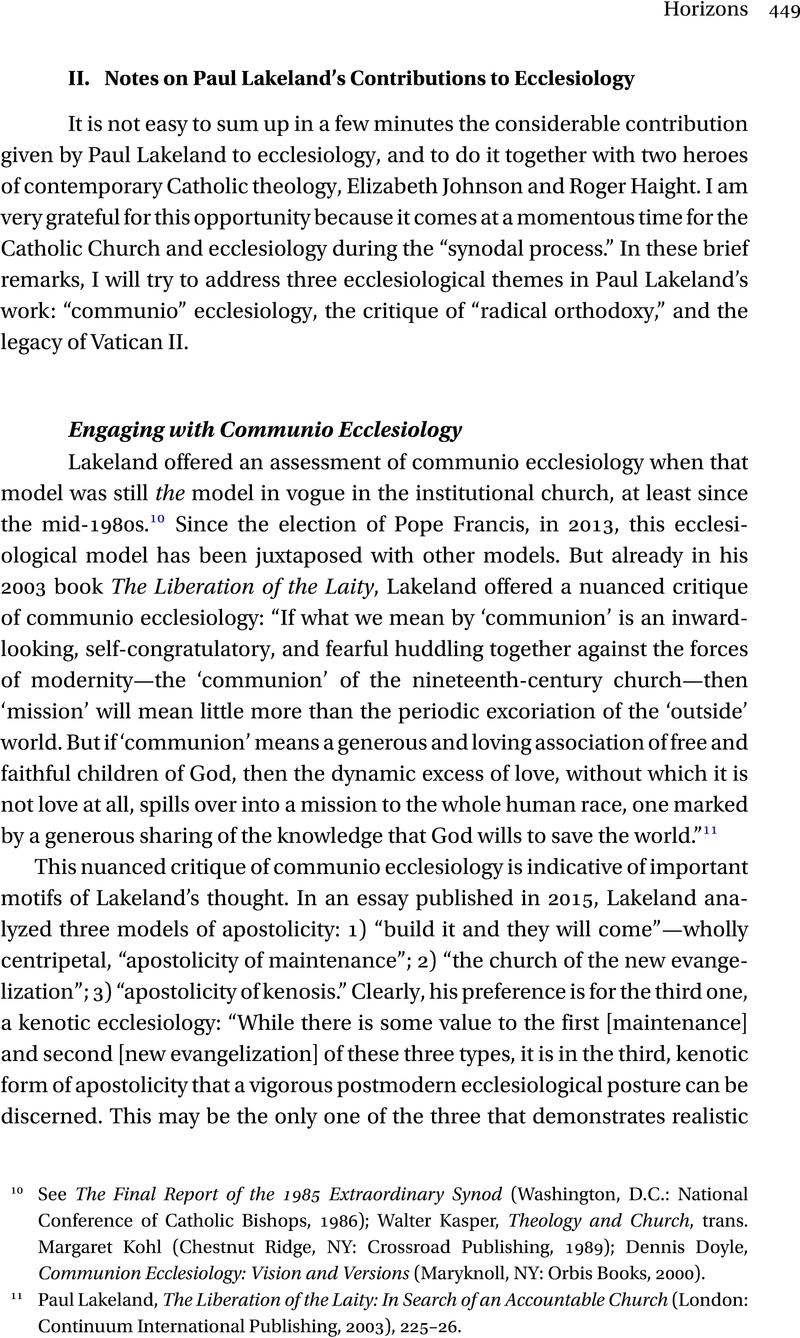No CrossRef data available.
Article contents
II. Notes on Paul Lakeland’s Contributions to Ecclesiology
Published online by Cambridge University Press: 08 March 2024
Abstract

- Type
- Theological Roundtable
- Information
- Copyright
- © College Theology Society 2024
References
10 See The Final Report of the 1985 Extraordinary Synod (Washington, D.C.: National Conference of Catholic Bishops, 1986)Google Scholar; Kasper, Walter, Theology and Church, trans. Kohl, Margaret (Chestnut Ridge, NY: Crossroad Publishing, 1989)Google Scholar; Doyle, Dennis, Communion Ecclesiology: Vision and Versions (Maryknoll, NY: Orbis Books, 2000).Google Scholar
11 Lakeland, Paul, The Liberation of the Laity: In Search of an Accountable Church (London: Continuum International Publishing, 2003), Google Scholar.
12 Lakeland, Paul, “Ecclesiology and the Use of Demography: Three Models of Apostolicity,” in A Church with Open Doors: Catholic Ecclesiology for the Third Millennium, ed. Gaillardetz, Richard R. and Hahnenberg, Edward P. (Collegeville, MN: Liturgical Press, 2015), 23–42Google Scholar, at 25.
13 Lakeland, Paul, A Council That Will Never End:. Lumen Gentium and the Church Today (Collegeville, MN: Liturgical Press, 2013), .Google Scholar
14 Lakeland, A Council That Will Never End, 146–47.
15 Lakeland, A Council That Will Never End, 146–47.
16 Milbank, John, Pickstock, Catherine, Ward, Graham, eds., Radical Orthodoxy: A New Theology (London: Routledge, 1999).CrossRefGoogle Scholar
17 Joseph A. Komonchak: “What the Church becomes in any age is never determined solely by the principles that constitute its distinctive life, but always by an interpretation and realization of them which actively engaged the challenges of the larger society and culture,” in Lakeland, The Liberation of the Laity, 220.
18 See Bell, Daniel M., Liberation Theology After the End of History: The Refusal to Cease Suffering (London: Routledge, 2001).Google Scholar
19 Lakeland, The Liberation of the Laity, 234.
20 Lakeland, The Liberation of the Laity, 246.
21 Lakeland, Paul, Church: Living Communion (Collegeville, MN: Liturgical Press, 2009) Google Scholar.
22 Lakeland, The Liberation of the Laity, 265.
23 See Lakeland, Paul, Catholicism at the Crossroads (London: Continuum International Publishing, 2007), CrossRefGoogle Scholar.
24 Lakeland, Catholicism at the Crossroads, 148.
25 Lakeland, Church, 130–31.
26 Lakeland, Church, 138.
27 Lakeland, Church, 146–56.
28 Lakeland, A Council That Will Never End, 134–35.
29 Lakeland, Paul, “What Does Rome Have to Learn from Geneva? Whole-Body Ecclesiology and the Inductive Turn,” in Receptive Ecumenism as Transformative Ecclesial Learning: Walking the Way to a Church Re-formed, ed. Murray, Paul D., Ryan, Gregory A., and Lakeland, Paul (Oxford and New York: Oxford University Press, 2022), Google Scholar.
30 Lakeland, “What Does Rome Have to Learn from Geneva?” 127.
31 Lakeland, “What Does Rome Have to Learn from Geneva?” 128, 124.
32 Lakeland, “What Does Rome Have to Learn from Geneva?” 129–30.





